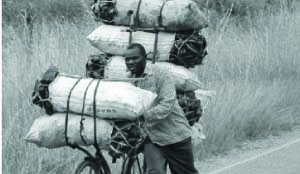By DAVID YOUNG –
“I WAS among the people who used to cut down trees for charcoal burning…. But I have come to understand the devastating impact of deforestation. I also take time to share this information with friends.”
These are the words of Mwape Village resident Derrick Daka that are now being repeated by many community members in Eastern Zambia thanks to United States (US)-Zambia cooperation to combat deforestation and climate change.
Zambia has had one of the world’s highest deforestation rates in the world – a problem that affects community members in areas losing forests, Zambia as a whole, and in fact the entire world.
That’s because deforestation is a contributor to climate change through losses in forest canopy, which then contributes to global warming.
Deforested areas can also become dried out and less productive. Protecting Zambia’s forests, as Mr Daka and many of his fellow community members do through USAID-funded programs such as the Nyimba Forest Project, helps us reverse climate change and certainly helps Zambia to protect vegetation and wildlife that face a loss of habitat through deforestation.
April 22 is Earth Day, and during the month of April the Embassy reflects on the ways that the US and Zambia work together to protect the environment.
Through the more than 280 US Peace Corps Volunteers, many of whom are environment volunteers, we work in partnership with local communities throughout Zambia.
Peace Corps Zambia’s Linking Income and the Environment (LIFE) programme empowers rural community members to improve food security in ways that conserve natural resources.
Volunteers working as forest extension agents partner with Zambian colleagues to promote the incorporation of agro-forestry technologies, soil and water management practices, and improved gardening techniques in the farming system.
In addition, volunteers are working side by side with Zambians to build the capacity of community members to generate additional household income.
A Peace Corps Environment Volunteer working in a rural community in Petauke noted that “Petauke is a heavily deforested district, and an issue that arises from this is the need for village women to spend a significant amount of time going farther and farther afield to collect firewood.”
The volunteer works with Zambian community members to raise awareness among villagers, especially women, about the benefits of fuel efficient stoves (FES).
The volunteer has observed that each successive group taught to use FES serves as promoters to other groups and villages who then request sessions on building fuel-efficient stoves for others to put to use.
The widespread use of FES reduces the rate of deforestation, as the amount of fuel wood that is being used by community members for cooking is reduced.
In addition to our collaboration to halt deforestation, the US is also proud to partner with Zambians to protect the country’s fierce but fragile wildlife from poachers and traffickers.
We have worked extensively through training and exchange programs with champions such as Andrew Chomba, the head of operations and technical services for the Zambia Wildlife Authority, who works with the US, other foreign missions, NGOs, and community members to stop poachers and wildlife traffickers in their tracks. Mr Chomba’s achievements include halting the theft from the Government recovered ivory stocks, shutting down an illegal shoebill trading operation in the Bangweulu Wetlands, and, through joint initiatives with the ZAWA Intelligence and Investigations Unit, recovering ivory, live birds, and other wildlife from the thriving markets in Lusaka.
“We have heroes such as Andrew Chomba to thank for the conservation of wildlife for future generations to enjoy. As we look to the future, the US applauds the efforts of many Zambians to preserve its national parks, waterways, and landmarks.”
As in most countries, Zambians have choices to make to ensure that economic development activities do not result in the destruction of national parks and forests and the pollution of waterways and wetlands. Zambia’s foresight in protecting national parks such as the Lower Zambezi, Mosi-oa-Tunya, and Kafue National Parks will benefit Zambians for generations.
As global citizens we recognise that deforestation, climate change, environmental degradation, and destruction of wildlife are some of our most urgent, complex, and far-reaching challenges.
And every day Zambians like Derrick Daka, Andrew Chomba, and thousands of other responsible community members, together with American and other international partners, are making positive choices that impact you, me, and the world.
The US is committed to continue working together with the Zambian people and Government to create viable solutions to ensure that our children and our children’s children enjoy a clean, healthy, and beautiful environment.
(The author is US Chargé d’Affaires)







